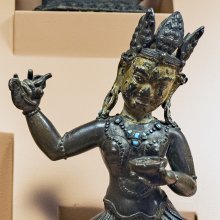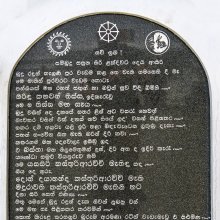Daka, Ḍāka, Dāka, Ḍakā: 16 definitions
Introduction:
Daka means something in Buddhism, Pali, Hinduism, Sanskrit, Marathi, Hindi. If you want to know the exact meaning, history, etymology or English translation of this term then check out the descriptions on this page. Add your comment or reference to a book if you want to contribute to this summary article.
Alternative spellings of this word include Daak.
Images (photo gallery)
In Buddhism
Tibetan Buddhism (Vajrayana or tantric Buddhism)
Source: academia.edu: The Structure and Meanings of the Heruka MaṇḍalaḌakā (डका) refers to a “drum” and represents one of the items held in the left hand of Heruka: one of the main deities of the Herukamaṇḍala described in the 10th century Ḍākārṇava chapter 15. Heruka is positioned in the Lotus (padma) at the center; He is the origin of all heroes; He has 17 faces (with three eyes on each) and 76 arms [holding, for example, ḍakā]; He is half black and half green in color; He is dancing on a flaming sun placed on Bhairava and Kālarātrī.
Source: MDPI Books: The Ocean of HeroesḌakā (डका) (or Ḍhakkā) refers to a type of drum and represents one of the objects held in the thirty-eight right hands of Heruka: the main deity positioned in the center of the Lotus in the Sahaja (“innate”) layer of the Herukamaṇḍala: a five-fold maṇḍala that is widely taught in the scriptures belonging to the Saṃvara scriptural tradition.—Heruka in the Ḍākārṇava has seventeen faces (with three eyes on each) and seventy-six arms [holding, for example, the ḍakā drum]. His body is half black and half green. [...]
Note: This drum is named ḍukkā and ḍukā in the parallel parts in the Ḍākārṇava (10.46 c) and (29.3 c), respectively. There is also a possibility that this derives from huḍukkā, a kind of drum.

Tibetan Buddhism includes schools such as Nyingma, Kadampa, Kagyu and Gelug. Their primary canon of literature is divided in two broad categories: The Kangyur, which consists of Buddha’s words, and the Tengyur, which includes commentaries from various sources. Esotericism and tantra techniques (vajrayāna) are collected indepently.
Languages of India and abroad
Pali-English dictionary
Source: BuddhaSasana: Concise Pali-English Dictionarydaka : (nt.) water.
Source: Sutta: The Pali Text Society's Pali-English DictionaryDaka, (nt.) (=udaka, aphæretic from combinations like sītodaka which was taken for sīto+daka instead of sīt’odaka) Vin.III, 112; S.III, 85; A.II, 33=Nd2 420 B3 (: the latter has udaka, but Nd1 14 daka).
— or —
Ḍāka, (m. nt.) (Sk. sāka (nt.) on ś›ḍ cp. Sk. sākinī› dākinī) green food, eatable herbs, vegetable Vin.I, 246 (°rasa), 248; Th.2, 1; Vv 206 (v. l. sāka); VvA.99 (=taṇḍuleyyakādi-sākavyañjana). (Page 291)

Pali is the language of the Tipiṭaka, which is the sacred canon of Theravāda Buddhism and contains much of the Buddha’s speech. Closeley related to Sanskrit, both languages are used interchangeably between religions.
Marathi-English dictionary
Source: DDSA: The Molesworth Marathi and English Dictionaryḍāka (डाक).—f ( H) A disposition (of horses, runners, bearers) along a road to convey the post or travelers. 2 R A necromancy among Shudras,--certain rites to raise the spirit of a defunct and make him speak. 3 A musical instrument used on the above occasion and on occasions of gōndhaḷa.
Source: DDSA: The Aryabhusan school dictionary, Marathi-Englishḍāka (डाक).—f A disposition (of horses, runners &c.) along a road to convey the post or travellers.
Marathi is an Indo-European language having over 70 million native speakers people in (predominantly) Maharashtra India. Marathi, like many other Indo-Aryan languages, evolved from early forms of Prakrit, which itself is a subset of Sanskrit, one of the most ancient languages of the world.
Sanskrit dictionary
Source: DDSA: The practical Sanskrit-English dictionaryḌāka (डाक).—An imp (attending Kālī).
Derivable forms: ḍākaḥ (डाकः).
--- OR ---
Daka (दक).—Water; as in दकोदर (dakodara).
Derivable forms: dakam (दकम्).
--- OR ---
Dāka (दाक).—
1) A giver, donor.
2) An institutor of a sacrifice (who employs and pays the priests.).
Derivable forms: dākaḥ (दाकः).
--- OR ---
Dāka (दाक).—&c. See under दा (dā).
See also (synonyms): dāti, dātṛ, dāna, dānu.
Source: Cologne Digital Sanskrit Dictionaries: Edgerton Buddhist Hybrid Sanskrit DictionaryDaka (दक).—(nt.; = Pali id., for Sanskrit udaka; rare in Sanskrit except dakodara, dropsy, Suśr., but see Schmidt, Nach- träge), water: khaṇḍaghaṭakaṃ dakasya (v.l. uda°) Mahāvastu ii.429.17 (prose); daka-rākṣasa, water-ogre, = udaka°, q.v., Mahāvastu iii.11.19 (v.l. ud°); 29.14, 15; Divyāvadāna 105.3 ff.; daka-candra, moon in water, = udaka-c°, q.v., māyā- marīcī-dakacandrakalpā Suvarṇabhāsottamasūtra 250.2 (verse; read so, or with v.l. °marīcy-ūd°, m.c.; Nobel unmetrical(ly)); marīci-dakacan- dra-samāḥ Rāṣṭrapālaparipṛcchā 51.16 (verse); dakacandra also Śatasāhasrikā-prajñāpāramitā 542.12 (prose) and Śikṣāsamuccaya 204.15 (verse, cited from Lalitavistara which reads udacandra, q.v.); in Divyāvadāna 231.1 (prose) read, uparimaṃ dakaskandham ādāya (see s.v. skandha 1); other cpds., [Page260-2b+ 14] Mahāvastu ii.152.13; 171.5 (these are prose); Gaṇḍavyūha 27.21 (verse, could be m.c.).
Source: Cologne Digital Sanskrit Dictionaries: Shabda-Sagara Sanskrit-English DictionaryDaka (दक).—n.
(-kaṃ) Water. E. See udaka, the initial vowel being dropped.
--- OR ---
Dāka (दाक).—m.
(-kaḥ) 1. A donor, one who makes presents, especially to Brahmans. 2. A sacrificer, one who pays all the expenses of the ceremony, and employs the officiating priests. E. dā to give, ka Unadi aff.
Source: Cologne Digital Sanskrit Dictionaries: Monier-Williams Sanskrit-English Dictionary1) Ḍāka (डाक):—m. an imp attending Kālī, [Kālacakra v, 38.]
2) Daka (दक):—n. = ud, water, [Phetkāriṇī-tantra xvii]
3) cf. dagārgala.
4) Dāka (दाक):—[from dā] m. a donor, [Uṇādi-sūtra iii, 40 [Scholiast or Commentator]]
5) [v.s. ...] a sacrificer, [ib.]
Source: Cologne Digital Sanskrit Dictionaries: Yates Sanskrit-English Dictionary1) Daka (दक):—(kaṃ) 1. n. Water.
2) Dāka (दाक):—(kaḥ) 1. m. A donor; a sacrifice.
Source: DDSA: Paia-sadda-mahannavo; a comprehensive Prakrit Hindi dictionary (S)Daka (दक) in the Sanskrit language is related to the Prakrit words: Daga, Daya.
[Sanskrit to German]
Sanskrit, also spelled संस्कृतम् (saṃskṛtam), is an ancient language of India commonly seen as the grandmother of the Indo-European language family (even English!). Closely allied with Prakrit and Pali, Sanskrit is more exhaustive in both grammar and terms and has the most extensive collection of literature in the world, greatly surpassing its sister-languages Greek and Latin.
Hindi dictionary
Source: DDSA: A practical Hindi-English dictionary1) Ḍāka (डाक) [Also spelled daak]:—(nf) mail, post, dak; -[kharca] postage; ~[khānā] a post office; -[gāḍī] a mail train; ~[ghara] a post office; -[baṃgalā] a dak bungalow, a rest house for officials, etc.; -[bhāra] postage; -[vyaya] postage.
2) Ḍākā (डाका):—(nm) a dacoity; ~[janī] commitment of (a series of) dacoities; —[ḍālanā] to rob, to commit a dacoity; —[ḍālanā, ijjata para] to rob one of one’s honour; to make an assualt on one’s modesty.
...
Kannada-English dictionary
Source: Alar: Kannada-English corpusDaka (ದಕ):—[noun] water.
--- OR ---
Dāka (ದಾಕ):—[noun] = ದಾಕು [daku]1.
Kannada is a Dravidian language (as opposed to the Indo-European language family) mainly spoken in the southwestern region of India.
See also (Relevant definitions)
Starts with (+38): Dakacandra, Dakacauki, Dakadaka, Dakadakanem, Dakadakita, Dakai, Dakait, Dakaita, Dakaiti, Dakaja, Dakaka, Dakala, Dakalavanika, Dakali, Dakalu, Dakamarga, Dakamva Dakamva, Dakan, Dakana, Dakanan.
Ends with (+1206): Abdaka, Abhedaka, Abhinindaka, Abhivadaka, Abhivandaka, Acantodaka, Acchadaka, Acchodaka, Accodaka, Achchhadaka, Achchhodaka, Acodaka, Adaka, Addaka, Addebadaka, Addhadandaka, Addhamundaka, Adityamandaka, Agamasampadaka, Aghodaka.
Full-text (+247): Daya, Daga, Apurvanishpadaka, Anumodaka, Dakalavanika, Anuvadaka, Pancadaka, Apavadaka, Dakodara, Anekakshetravyavacchedaka, Lavanika, Abhedaka, Dakas, Dakarakshasa, Omo-daka, Gharmodaka, Svedodaka, Ushnodaka, Kalindakanivapa, Daccha.
Relevant text
Search found 11 books and stories containing Daka, Ḍāka, Dāka, Ḍakā, Ḍākā, Daaka; (plurals include: Dakas, Ḍākas, Dākas, Ḍakās, Ḍākās, Daakas). You can also click to the full overview containing English textual excerpts. Below are direct links for the most relevant articles:
Chaitanya Bhagavata (by Bhumipati Dāsa)
Verse 2.13.33 < [Chapter 13 - The Deliverance of Jagāi and Mādhāi]
Verse 3.5.686 < [Chapter 5 - The Pastimes of Nityānanda]
Verse 1.7.21 < [Chapter 7 - Śrī Viśvarūpa Takes Sannyāsa]
Lankavatara Sutra (by Daisetz Teitaro Suzuki)
The Great Chariot (by Longchenpa)
Part 4 - The particular details < [E. Knowing what is to be abandoned and accepted, and how the siddhis are received]
Part 1 - How to practice < [E. Knowing what is to be abandoned and accepted, and how the siddhis are received]
Part 3e.2a - The self-existing nirmanakaya < [B. The explanation of the kayas and wisdoms]
Vinaya Pitaka (3): Khandhaka (by I. B. Horner)
The story of Keṇiya the matted-hair ascetic < [6. Medicine (Bhesajja)]
The story Roja the Malla < [6. Medicine (Bhesajja)]
The Devi Bhagavata Purana (by Swami Vijñanananda)
A History of Indian Philosophy Volume 1 (by Surendranath Dasgupta)
Part 1 - The place of the Upaniṣads in Vedic literature < [Chapter III - The Earlier Upaniṣads (700 B.c.— 600 B.c.)]

